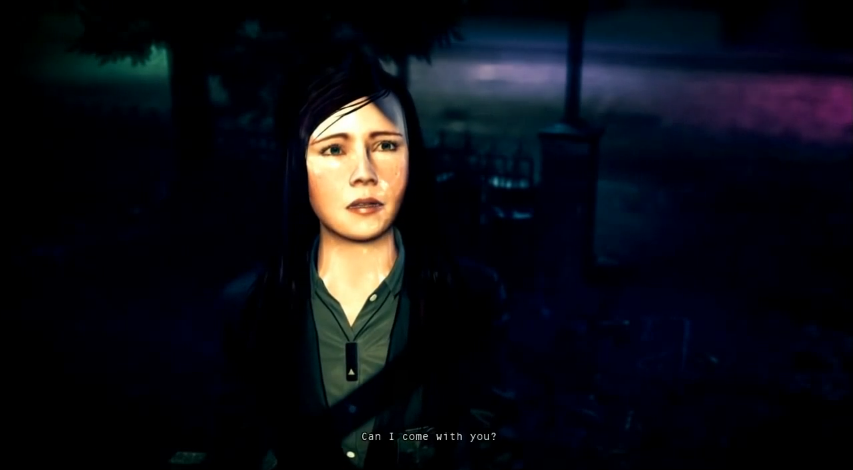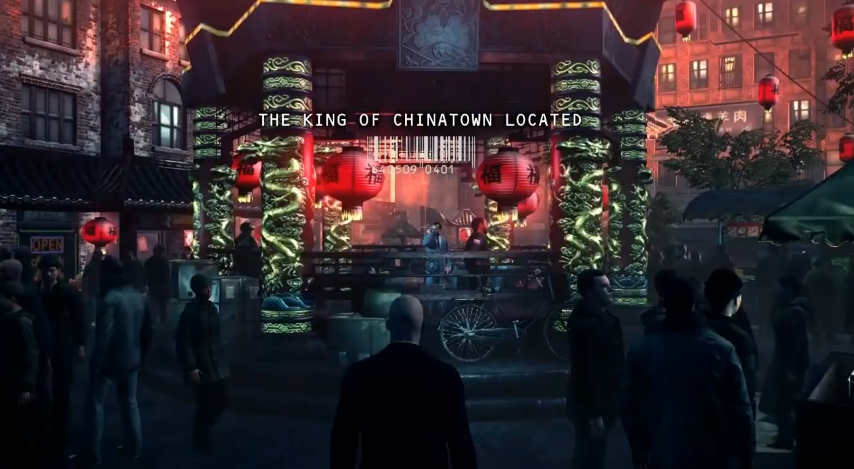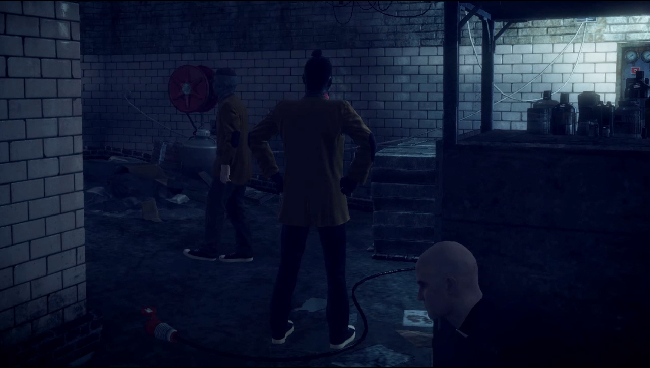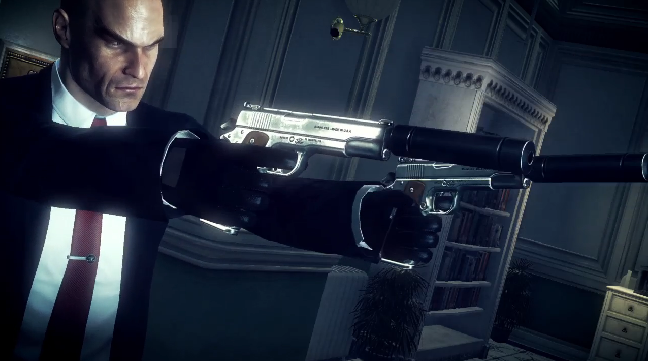HITMAN ABSOLUTION (X360)
The Hitman series has enjoyed a good deal of success since its modest, flawed beginnings in 2000. After starting off as a PC exclusive, it would become one of the sixth generation’s stealth highlights, and seemed destined for greatness on the seventh with the excellent Blood Money. But with the collapse of Eidos, the series remained in lull for six long years before resurfacing, under the guide of Square Enix, as Absolution. While it contains many elements of old, there are a surprising number of changes to the time-tested gameplay. And while IO deserve credit for attempting to change it up, it’s clear that some things are best left alone.
The story, for starters, plays a much larger role in Absolution. Continuing the narrative on from Blood Money, Agent 47 is forced to kill his long-time handler Diana after she goes rogue from The Agency. He is forced to execute Diana after a brief tutorial teaching the basics, but he too goes on the run in an attempt to protect a girl called Victoria, who has more to her background than meets the eye. Absolution suffers from an inconsistent tone, as dark and graphic moments contrast hugely with over the top, ridiculous scenarios. One level has you avoiding nun assassins, for example, and it never quite gels into a cohesive story. The dialogue is corny, and the acting is worse.
The story, for starters, plays a much larger role in Absolution. Continuing the narrative on from Blood Money, Agent 47 is forced to kill his long-time handler Diana after she goes rogue from The Agency. He is forced to execute Diana after a brief tutorial teaching the basics, but he too goes on the run in an attempt to protect a girl called Victoria, who has more to her background than meets the eye. Absolution suffers from an inconsistent tone, as dark and graphic moments contrast hugely with over the top, ridiculous scenarios. One level has you avoiding nun assassins, for example, and it never quite gels into a cohesive story. The dialogue is corny, and the acting is worse.
That being said, Absolution starts really strong. While the tutorial is a nice refresh on the basic elements of Hitman, as you learn about disguises, hiding bodies and more, the second level is dazzling, both technically and from a design standpoint. Taking place in a spacious, yet positively bustling Chinatown, there are a dozen ways to take out the target, including pushing him down a manhole, disguising 47 as the target’s dealer or poisoning his coffee. And, of course, you can just go guns blazing and massacre everything in sight. And there is no sacrifice on detail, as hundreds of NPCs carry out shopping, gossiping and more. It’s a stunning showcase of the technical power, as the frame rate and detail never lets up. Needless to say, between its great stealth gameplay, excellent freedom and immersive environment, Chinatown will leave a huge grin on your face.
But as with the story, things start to deteriorate from there. IO attempts to broaden Absolution’s appeal, and suddenly the initially impressive design is replaced by rather linear pathways. Rooms become one-dimensional, and while there’s still plenty of visual splendour and immersive moments, it’s killed by idiotic A.I. They’ll outright ignore you subduing a nearby guard, or when you throw a book right past their head. The design lacks the imagination shown in the earlier stages, and feels out of place in a Hitman game. Worse are the scripted moments, including shootouts and slow-mo gunfights. These feel completely unsatisfying, as if just to show off the new cover system, and while IO should be praised for changing the formula, it serves to dilute why Hitman was so good before.
But perhaps its most polarizing new feature is the Instinct Mode. Instinct is like a cross between Batman’s X-Ray vision and Assassin’s Creed’s blend mode, allowing you to see through walls, track guard patterns and use disguises. This is where it gets weird. You see, though disguises will hide you from a majority of NPCs, any character wearing the same clothing will be suspicious. You then are forced to use Instinct to progress, where Agent 47 comically hides his face. As if that’s less suspicious. It becomes a crutch on lower difficulties, allowing you to remove the tactility and planning the series has been known for. But to be honest, with the rigid level design on most chapters, you probably won’t end up using it bar sneaking by guards.
But as with the story, things start to deteriorate from there. IO attempts to broaden Absolution’s appeal, and suddenly the initially impressive design is replaced by rather linear pathways. Rooms become one-dimensional, and while there’s still plenty of visual splendour and immersive moments, it’s killed by idiotic A.I. They’ll outright ignore you subduing a nearby guard, or when you throw a book right past their head. The design lacks the imagination shown in the earlier stages, and feels out of place in a Hitman game. Worse are the scripted moments, including shootouts and slow-mo gunfights. These feel completely unsatisfying, as if just to show off the new cover system, and while IO should be praised for changing the formula, it serves to dilute why Hitman was so good before.
But perhaps its most polarizing new feature is the Instinct Mode. Instinct is like a cross between Batman’s X-Ray vision and Assassin’s Creed’s blend mode, allowing you to see through walls, track guard patterns and use disguises. This is where it gets weird. You see, though disguises will hide you from a majority of NPCs, any character wearing the same clothing will be suspicious. You then are forced to use Instinct to progress, where Agent 47 comically hides his face. As if that’s less suspicious. It becomes a crutch on lower difficulties, allowing you to remove the tactility and planning the series has been known for. But to be honest, with the rigid level design on most chapters, you probably won’t end up using it bar sneaking by guards.
But at the very least, Absolution is feature-packed. Levels come complete with challenges which add bonus points to your score, ranging from collectibles and avoiding detection to oddball task suck as hitting enemies with marijuana bongs. And the campaign is rather long too, taking a good 15 hours to finish. But the highlight of the package is Contracts mode. Here, sections of the game are available to everyone, and missions can be created. You dictate the targets, what weapon you must use, whether you’re detected and how quickly it must be done, allowing expert Hitman fans to truly show off their skills. It’s an incredibly fun mode, allowing for freedom while giving you incentive to improve. And with money for upgrades being reward on each contract, it’s sustainable fun.
Absolution absolutely excels in its visuals. Everything just comes packed with a high level of detail, from the beautifully-lit levels to detailed and smoothly animated character models. The environments are varied too, ranging from a colourful pad smoked up by marijuana to a scientific testing facility; though it’s a shame the story taking you to these places isn’t as coherent. The sound also contributes to the immersion, such as how you can listen to entire phone conversations. Though not scored by series veteran Jesper Kyd, the soundtrack is still good, building up atmosphere and shooting sounds pretty realistic. Just mute the dialogue.
A drastic change to the formula, Hitman Absolution certainly comes packed with exciting moments and pretty decent gameplay for the most part, but its changes are where the game begins to feel disappointing. A lot of the elements which made the series great – whether it’s the open-ended mission design, clever details and satisfying contracts – are cut, replaced by straightforward levels and action set-pieces. While it’ll broaden the appeal, there’s just not enough meaty, satisfying stealth gameplay, and while the presentation is dazzling, the story is disorganised. Contracts serves as a fun diversion, but outside of that, only the die-hard will be able to fully appreciate the successes of Absolution.
Absolution absolutely excels in its visuals. Everything just comes packed with a high level of detail, from the beautifully-lit levels to detailed and smoothly animated character models. The environments are varied too, ranging from a colourful pad smoked up by marijuana to a scientific testing facility; though it’s a shame the story taking you to these places isn’t as coherent. The sound also contributes to the immersion, such as how you can listen to entire phone conversations. Though not scored by series veteran Jesper Kyd, the soundtrack is still good, building up atmosphere and shooting sounds pretty realistic. Just mute the dialogue.
A drastic change to the formula, Hitman Absolution certainly comes packed with exciting moments and pretty decent gameplay for the most part, but its changes are where the game begins to feel disappointing. A lot of the elements which made the series great – whether it’s the open-ended mission design, clever details and satisfying contracts – are cut, replaced by straightforward levels and action set-pieces. While it’ll broaden the appeal, there’s just not enough meaty, satisfying stealth gameplay, and while the presentation is dazzling, the story is disorganised. Contracts serves as a fun diversion, but outside of that, only the die-hard will be able to fully appreciate the successes of Absolution.
|
VERDICT
Visual: 10/10 Audio: 7/10 Gameplay: 6/10 Longevity: 8/10 OVERALL: 6/10 |




